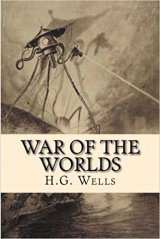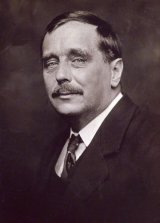The War of the Worlds Page #13
The War of the Worlds is a science fiction novel by English author H. G. Wells first serialised in 1897 by Pearson's Magazine in the UK and by Cosmopolitan magazine in the US.
Between these three main centres of light--the houses, the train, and the burning county towards Chobham--stretched irregular patches of dark country, broken here and there by intervals of dimly glowing and smoking ground. It was the strangest spectacle, that black expanse set with fire. It reminded me, more than anything else, of the Potteries at night. At first I could distinguish no people at all, though I peered intently for them. Later I saw against the light of Woking station a number of black figures hurrying one after the other across the line. And this was the little world in which I had been living securely for years, this fiery chaos! What had happened in the last seven hours I still did not know; nor did I know, though I was beginning to guess, the relation between these mechanical colossi and the sluggish lumps I had seen disgorged from the cylinder. With a queer feeling of impersonal interest I turned my desk chair to the window, sat down, and stared at the blackened country, and particularly at the three gigantic black things that were going to and fro in the glare about the sand pits. They seemed amazingly busy. I began to ask myself what they could be. Were they intelligent mechanisms? Such a thing I felt was impossible. Or did a Martian sit within each, ruling, directing, using, much as a man's brain sits and rules in his body? I began to compare the things to human machines, to ask myself for the first time in my life how an ironclad or a steam engine would seem to an intelligent lower animal. The storm had left the sky clear, and over the smoke of the burning land the little fading pinpoint of Mars was dropping into the west, when a soldier came into my garden. I heard a slight scraping at the fence, and rousing myself from the lethargy that had fallen upon me, I looked down and saw him dimly, clambering over the palings. At the sight of another human being my torpor passed, and I leaned out of the window eagerly. "Hist!" said I, in a whisper. He stopped astride of the fence in doubt. Then he came over and across the lawn to the corner of the house. He bent down and stepped softly. "Who's there?" he said, also whispering, standing under the window and peering up. "Where are you going?" I asked. "God knows." "Are you trying to hide?" "That's it." "Come into the house," I said. I went down, unfastened the door, and let him in, and locked the door again. I could not see his face. He was hatless, and his coat was unbuttoned. "My God!" he said, as I drew him in. "What has happened?" I asked. "What hasn't?" In the obscurity I could see he made a gesture of despair. "They wiped us out--simply wiped us out," he repeated again and again. He followed me, almost mechanically, into the dining room. "Take some whiskey," I said, pouring out a stiff dose. He drank it. Then abruptly he sat down before the table, put his head on his arms, and began to sob and weep like a little boy, in a perfect passion of emotion, while I, with a curious forgetfulness of my own recent despair, stood beside him, wondering. It was a long time before he could steady his nerves to answer my questions, and then he answered perplexingly and brokenly. He was a driver in the artillery, and had only come into action about seven. At that time firing was going on across the common, and it was said the first party of Martians were crawling slowly towards their second cylinder under cover of a metal shield. Later this shield staggered up on tripod legs and became the first of the fighting-machines I had seen. The gun he drove had been unlimbered near Horsell, in order to command the sand pits, and its arrival it was that had precipitated the action. As the limber gunners went to the rear, his horse trod in a rabbit hole and came down, throwing him into a depression of the ground. At the same moment the gun exploded behind him, the ammunition blew up, there was fire all about him, and he found himself lying under a heap of charred dead men and dead horses. "I lay still," he said, "scared out of my wits, with the fore quarter of a horse atop of me. We'd been wiped out. And the smell--good God! Like burnt meat! I was hurt across the back by the fall of the horse, and there I had to lie until I felt better. Just like parade it had been a minute before--then stumble, bang, swish!" "Wiped out!" he said. He had hid under the dead horse for a long time, peeping out furtively across the common. The Cardigan men had tried a rush, in skirmishing order, at the pit, simply to be swept out of existence. Then the monster had risen to its feet and had begun to walk leisurely to and fro across the common among the few fugitives, with its headlike hood turning about exactly like the head of a cowled human being. A kind of arm carried a complicated metallic case, about which green flashes scintillated, and out of the funnel of this there smoked the Heat-Ray. In a few minutes there was, so far as the soldier could see, not a living thing left upon the common, and every bush and tree upon it that was not already a blackened skeleton was burning. The hussars had been on the road beyond the curvature of the ground, and he saw nothing of them. He heard the Maxims rattle for a time and then become still. The giant saved Woking station and its cluster of houses until the last; then in a moment the Heat-Ray was brought to bear, and the town became a heap of fiery ruins. Then the Thing shut off the Heat-Ray, and turning its back upon the artilleryman, began to waddle away towards the smouldering pine woods that sheltered the second cylinder. As it did so a second glittering Titan built itself up out of the pit. The second monster followed the first, and at that the artilleryman began to crawl very cautiously across the hot heather ash towards Horsell. He managed to get alive into the ditch by the side of the road, and so escaped to Woking. There his story became ejaculatory. The place was impassable. It seems there were a few people alive there, frantic for the most part and many burned and scalded. He was turned aside by the fire, and hid among some almost scorching heaps of broken wall as one of the Martian giants returned. He saw this one pursue a man, catch him up in one of its steely tentacles, and knock his head against the trunk of a pine tree. At last, after nightfall, the artilleryman made a rush for it and got over the railway embankment.
Translation
Translate and read this book in other languages:
Select another language:
- - Select -
- 简体中文 (Chinese - Simplified)
- 繁體中文 (Chinese - Traditional)
- Español (Spanish)
- Esperanto (Esperanto)
- 日本語 (Japanese)
- Português (Portuguese)
- Deutsch (German)
- العربية (Arabic)
- Français (French)
- Русский (Russian)
- ಕನ್ನಡ (Kannada)
- 한국어 (Korean)
- עברית (Hebrew)
- Gaeilge (Irish)
- Українська (Ukrainian)
- اردو (Urdu)
- Magyar (Hungarian)
- मानक हिन्दी (Hindi)
- Indonesia (Indonesian)
- Italiano (Italian)
- தமிழ் (Tamil)
- Türkçe (Turkish)
- తెలుగు (Telugu)
- ภาษาไทย (Thai)
- Tiếng Việt (Vietnamese)
- Čeština (Czech)
- Polski (Polish)
- Bahasa Indonesia (Indonesian)
- Românește (Romanian)
- Nederlands (Dutch)
- Ελληνικά (Greek)
- Latinum (Latin)
- Svenska (Swedish)
- Dansk (Danish)
- Suomi (Finnish)
- فارسی (Persian)
- ייִדיש (Yiddish)
- հայերեն (Armenian)
- Norsk (Norwegian)
- English (English)
Citation
Use the citation below to add this book to your bibliography:
Style:MLAChicagoAPA
"The War of the Worlds Books." Literature.com. STANDS4 LLC, 2025. Web. 10 Jan. 2025. <https://www.literature.com/book/the_war_of_the_worlds_43>.




Discuss this The War of the Worlds book with the community:
Report Comment
We're doing our best to make sure our content is useful, accurate and safe.
If by any chance you spot an inappropriate comment while navigating through our website please use this form to let us know, and we'll take care of it shortly.
Attachment
You need to be logged in to favorite.
Log In